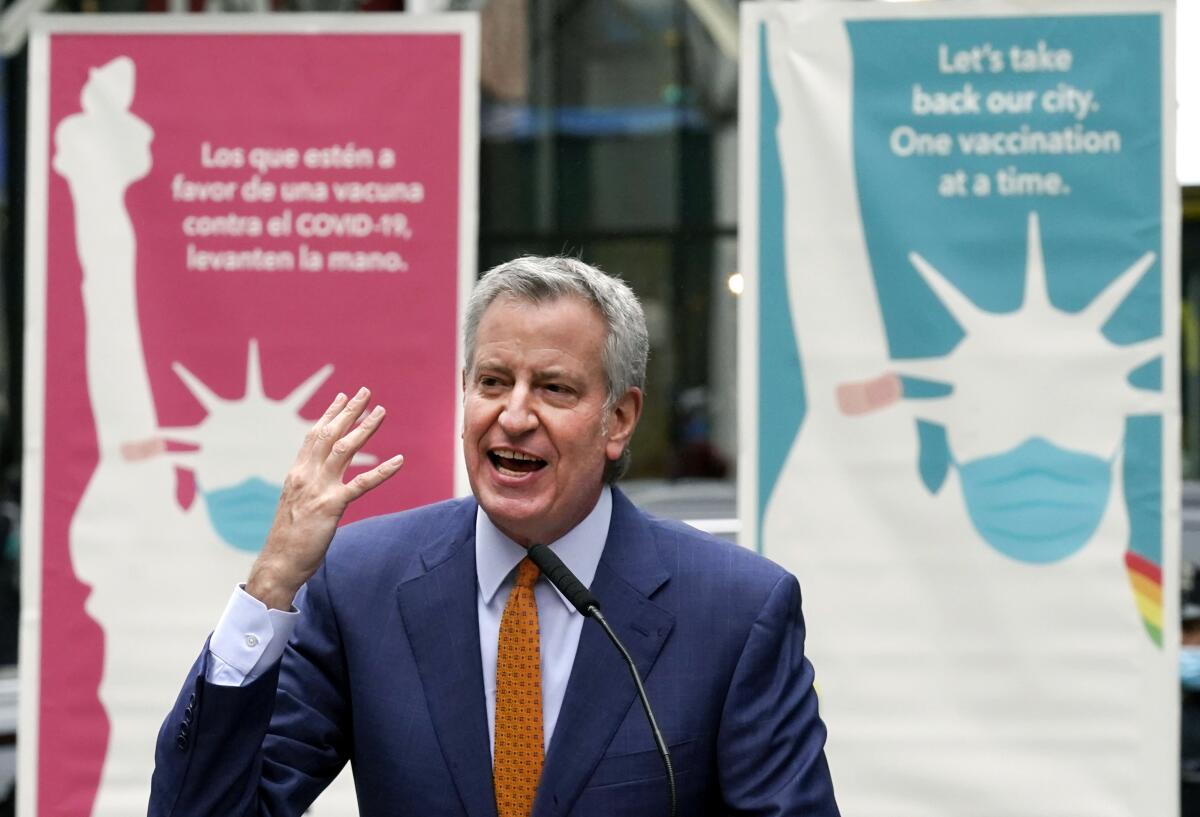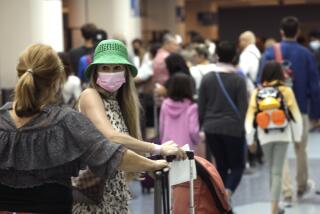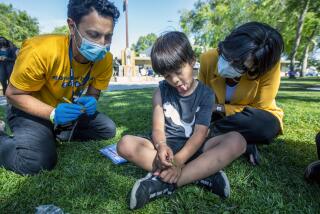Opinion: Welcome to America — for a COVID-19 vaccine shot

- Share via
Vaccine tourism started cropping up in the U.S. at the beginning of the year, but only unofficially; state governments didn’t endorse it, and foreigners preferred not to discuss it out loud. Now that millions of Americans have gotten their shots, though, the situation has changed.
New York City Mayor Bill de Blasio recently announced his plans to offer shots to tourists. Once approved, mobile vans with Johnson & Johnson vaccine will be placed at famous sights: the Empire State Building, Times Square, Brooklyn Bridge Park, the High Line and Central Park.
But isn’t it too early to invite tourists who might quickly spread COVID-19, including new and more virus variants? This question is especially relevant to travelers who come from abroad. Since April, no tourists who visit New York have been required to undergo coronavirus testing or be quarantined upon arrival.
But it’s not as risky as it might seem. The federal government is still banning entry by residents of countries with a high number of coronavirus cases, like India, Brazil, Iran, England and more than 20 other European countries. And even if the country is not on the Centers for Disease Control and Prevention blacklist, its citizens must get tested three days before their flight and show a negative result before boarding. Those requirements and the fact that tourists are going to get vaccinated shortly after their arrival raise hopes that this idea won’t lead to an increase in COVID-19 cases.
With COVID-19 cases and deaths continuing to drop in the Big Apple, the city is getting ready to lift most pandemic restrictions beginning May 19. Although one of the biggest tourist attractions, Broadway shows, will not resume until September, visitors can access many well-known sights for free after being vaccinated. For example, post-vaccination treats include free tickets to Mets and Yankees games and free tickets to the American Museum of Natural History.
New York is not the only state that wants to support its suffering tourism industry by offering the vaccine to visitors. Half of U.S. states do not require American citizenship or residency for vaccinations. The most popular destination for vaccine tourists so far is Texas. For the states it is an opportunity to boost the economy: Tourists, especially those who are going to receive two doses of a vaccine, will have to spend thousands of dollars coming to the U.S. and staying at hotels for weeks.
There is an evident interest in that sort of vacation among citizens of countries where shots are less accessible, such as Mexico, Canada and Thailand. Travel agencies are already offering package tours to the U.S. that include COVID-19 shots.
One other vaccine-producing country that welcomes tourists coming for jabs is Russia. However, tours are organized only for those who have Russian passports. So the offer is available basically for Russians who live abroad. Officials explain that their priority is to inoculate Russian citizens.
Should the U.S. also keep the vaccine only for its own citizens? So far, 35% of the U.S. population has been fully vaccinated, and around 60% received one dose. Researchers say the people who most wanted to get vaccinated have done so. Now officials are trying to make vaccination desirable for those who are hesitant. Domestic traveling — with perks for the newly vaccinated — can be one of the ways to promote vaccines.
Inviting foreign visitors to be vaccinated is also beneficial; apart from the revenue it will bring, it is a chance for the U.S. to help other countries and make vaccines accessible to the rest of the world. But there’s a downside we shouldn’t ignore. Given that this opportunity will be available only for wealthy tourists, it might expand the gap between rich nations or wealthy individuals, who can afford to travel to the U.S. for a shot, and poor regions or poor residents in developed countries. And, obviously, supporting vaccine tourism will not have the same effect as exporting more vaccines to India and other countries, where citizens desperately need them.
More to Read
A cure for the common opinion
Get thought-provoking perspectives with our weekly newsletter.
You may occasionally receive promotional content from the Los Angeles Times.










